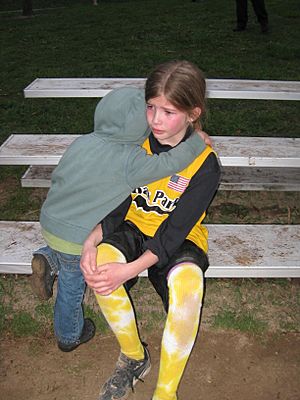Empathy facts for kids
Empathy is a word that means that someone is able to share or understand the emotions and feelings of another person. Someone may need to have a certain amount of empathy before they are able to feel compassion. The word was coined in 1909 by the English psychologist Edward.B. Titchener.
Contents
What is empathy?
Empathy is generally described as the ability to take on another person's perspective, to understand, feel, and possibly share and respond to their experience.
The word "empathy" comes from the Ancient Greek word "empatheia," which meant "physical affection or passion." Theodor Lipps, a psychologist, used the German word "Einfühlung" (meaning "feeling into") in 1903, and Edward B. Titchener translated "Einfühlung" into English as "empathy" in 1909.
Since the word "empathy" came into the English language, it has had many different definitions among researchers and everyday people. Empathy includes caring for other people and wanting to help them, feeling emotions that match another person's, understanding what another person is thinking or feeling, and making the differences between yourself and others less distinct.
Since empathy involves understanding the emotional states of other people, the way it is described comes from the way emotions are described. For example, if emotions are described by bodily feelings, then understanding the bodily feelings of another will be considered central to empathy. If emotions are described by a combination of beliefs and desires, then understanding those beliefs and desires will be more essential to empathy.
A person shows empathy when they communicate an accurate understanding of another person's actions, emotional states, and personal characteristics in a way that seems accurate and acceptable to the other person. This is a detailed way of looking at empathy that helps in understanding complex human emotions and interactions.
One's ability to recognize the bodily feelings or emotions of another is related to one's ability to imitate, and it seems to be based on a natural ability to connect the bodily movements and facial expressions one sees in another with the feelings of producing those corresponding movements or expressions oneself.
Compassion and sympathy are terms associated with empathy. A person feels compassion when they notice others are in need, and this feeling motivates that person to help. Like empathy, compassion has a wide range of definitions. Sympathy is a feeling of care and understanding for someone in need. Some include in sympathy an empathic concern for another person and the wish to see them better off or happier.
Empathy is also related to pity and emotional contagion. One feels pity towards others who might be in trouble or in need of help. This feeling is described as "feeling sorry" for someone. Emotional contagion is when a person imitates the emotions that others are showing without necessarily recognizing this is happening.
How it develops
By the age of two, children normally begin to show basic behaviors of empathy by having an emotional response that matches another person's emotional state. Even earlier, at one year of age, infants have some understanding of empathy; they understand that other people's actions have goals, just like their own actions. Toddlers sometimes comfort others or show concern for them.
Children between the ages of seven and twelve experience brain activity similar to what would occur if they themselves had been injured when seeing others being injured.
Although children can show some signs of empathy from as early as 18 months to two years, most do not demonstrate a full theory of mind until around the age of four. Theory of mind involves the ability to understand that other people may have beliefs that are different from one's own.
What influences empathy?
- Individual Differences: Some people are naturally more empathic than others.
- Sex Differences: On average, girls and women tend to score higher than boys and men on measures of empathy.
- Environmental Influences:Factors such as parenting style and relationships can affect the development of empathy in children.
Empathy in animals
Studies in animal behavior and neuroscience show that empathy is not just for humans. Empathy-like behaviors have been observed in primates, such as bonobos, and in rodents.
The neuroscience of empathy
Neuroscience helps us understand the neural basis of the mind's ability to understand and process emotion. Studies of mirror neurons attempt to measure the neural basis for human mind-reading and emotion-sharing abilities and thereby to explain the basis of the empathy reaction. People who score high on empathy tests have especially active mirror neuron systems.
Empathy involves two interconnected elements: cognitive empathy, which is understanding or recognizing the emotions another person is experiencing, and affective empathy, which refers to actually feeling or sharing those emotions yourself.
When empathy is impaired
Sometimes, empathy can be impaired. This can happen in conditions such as:
- Psychopathy: A condition characterized by antisocial behaviors and a lack of empathy.
- Autism: A condition that can affect social communication skills and empathy.
Effects of Empathy
Empathy is a valued trait in society. It is considered a motivating factor for unselfish behavior, while a lack of empathy is related to antisocial behavior.
Empathy helps us understand and anticipate the behavior of others. It can also help us build positive relationships.
Empathy plays a crucial role in resolving conflicts by shifting the focus to understanding the other person’s viewpoint, preventing miscommunication, and taking away biases.
Images for kids
See also
 In Spanish: Empatía para niños
In Spanish: Empatía para niños




